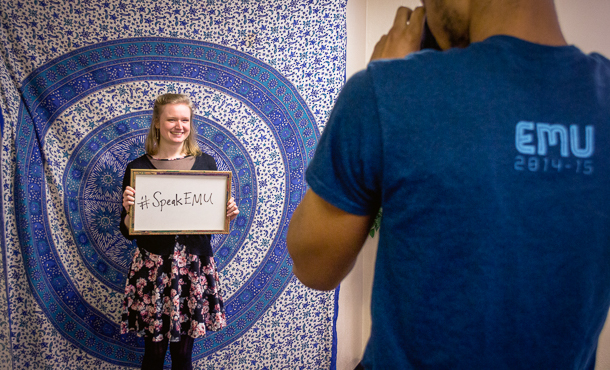One positive step towards preventing sexual violence on college campuses is overcoming the traditional silent treatment associated with the topic. As April is Sexual Assault Awareness Month, this spring has been the perfect time to break that silence, with the help of the newly formed Coalition on Sexual Violence Prevention at Eastern Mennonite University.
Senior Aliese Gingerich, founder of the group, says that even talking about sexual health “can be very hush-hush,” especially on a Christian college campus.
But that “hush-hush” has been less so lately. In recent controversy, a Rolling Stone article about the alleged gang rape of a female student at a University of Virginia fraternity party was recently discredited. Also in the press has been the recent government scrutiny, related to Title IX gender equity laws, of how colleges and universities handle sexual violence and harassment complaints.
Add the new Coalition’s efforts to the discussion. The group also goes by the acronym of “SPEAK,” which means Support survivors, Prevent assault, Empower bystanders, Advocate for change, and Know yourself and your rights.
“We want to cultivate a more honest and supportive campus climate for survivors of sexual assault,” says Gingerich, “and a climate that is more proactive in preventing sexual violence.”
Most incidents go unreported
Overcoming barriers to communication is the cornerstone of this student-initiated and administration-supported initiative, according to faculty sponsor and counseling center director Pam Comer.
“The more we are aware, talk openly, and face this as a campus,” says Comer, “the healthier we become.”
The group has raised awareness this month through a day of activism and a discussion on healthy sexuality in Common Grounds with the Campus Health Educators organization. They hosted a final discussion and meeting in University Commons to make plans for next year.
Two incidents of sexual assault have been reported from 2011-2013 in EMU’s most recent Campus Safety and Security Report. However, according to a 2003 study published by the international journal Criminal Justice and Behavior, “completed and/or attempted rapes [among college students] were reported to law enforcement officials in less than 5 percent of cases.”
Many people believe that sexual assault does not happen on a Christian campus, or are just unaware of the definition or consequences of sexual violence, says Gingerich.

“I think it’s an organization long overdue on campus,” says junior Hannah Mack-Boll. Her involvement in the coalition was prompted by survivors of sexual violence in her own life, who need support. “Part of that is prevention,” she said.
Graduate student Jodie Geddes, who is studying conflict transformation, says the coalition’s goals span from specific discussions of consent and assault to addressing “the way we uphold human dignity in our society.”
First-year Isaiah Williams was another member volunteering alongside Mack-Boll and Geddes at the coalition’s first event this month, a photo booth where students posed next to their own hand-written statements about what “consent is” and why they “stand with survivors.”
Engaging voices
Gingerich’s motivation to start the group comes from learning about this type of trauma through her mother’s work with the Rape Victim Advocacy Program in Iowa City, Iowa. Housed at the University of Iowa, the organization offers a variety of healing, support, advocacy and prevention services, including 24-hour crisis lines, support groups, and awareness campaigns.
“I just grew up hearing lots of stories” about both healthy and violent forms of sexuality, says Gingerich.
When her mother asked what training and resources EMU provides, Gingerich says, “then it dawned on me, we really have nothing. And that’s kind of ridiculous … it lit up a fire in me.”
Gingerich worked with Comer to propose a task force to Student Government Association and the President’s Cabinet. From this proposal, the Coalition was born as an offshoot of the Crisis Management Preparedness Team.
Goals of the coalition include engaging “a variety of voices,” says Geddes.
The group also wants to educate the campus community about how to respond to traumatized survivors – to encourage the campus community to become more “trauma-informed,” Comer says. “We often do not take into account the trauma the experience carries. Most people do not want to talk about this, know this, or face this. We are human beings, and this is one of our challenges, even at EMU.”
